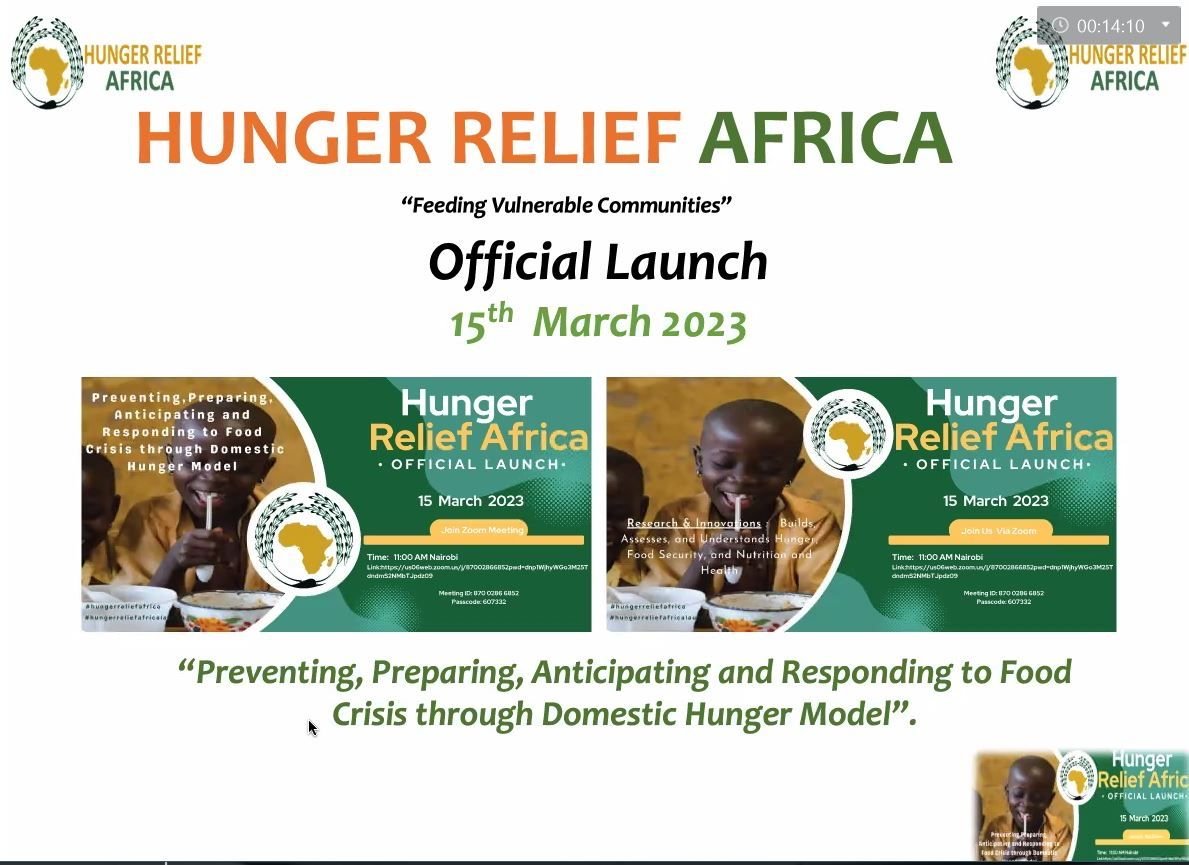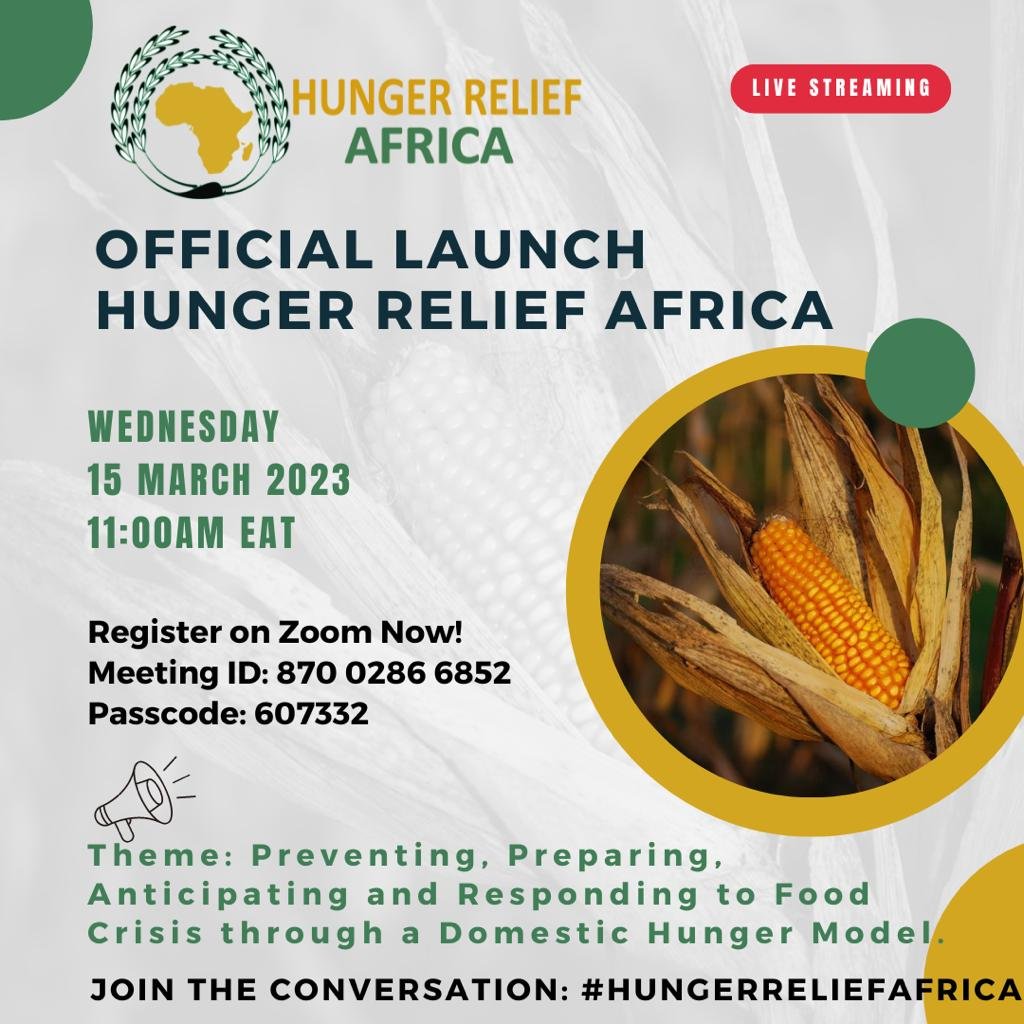International Women’s day 2024

To all the awe-inspiring women around the globe, we extend our warmest greetings on this International Women's Day! Your unwavering courage, resilience, and leadership continue to inspire us even in the toughest times.
Today, we pay homage to your zealous dedication towards realizing an empowered and fed Africa, and much beyond. Your steadfast commitment to empowering individuals, developing leadership skills, and ensuring food security is transformative in creating a prosperous future
The conviction that empowered women are the cornerstone of sustainable development forms the essence of our mission. By addressing food security, we are nurturing potential leaders who will contribute significantly to their communities, in collaboration with organizations like Hunger Relief Africa.
We express our profound gratitude to all women leading this movement, including those within Hunger Relief Africa. Be it working in the fields for food production, steering community empowerment drives, or taking up leadership roles within and outside Hunger Relief Africa - your determination is setting the course towards a more promising, inclusive future for all. Let's continue to band together and create a society where every woman has the opportunity to flourish. Let's keep inspiring each other and break boundaries.
In every meal served, every initiative started, and every life touched - women are at the forefront of our efforts, including those within Hunger Relief Africa. Your tireless efforts towards feeding the hungry, enhancing leadership capabilities, and empowering people truly embody the spirit of progress and compassion. Together, let's continue to make a meaningful difference in the lives of those we serve.
Feeding Hope: Battling Hunger and Promoting Food Security “Innovative Solutions that Address Global Hunger Crisis”
Date: October 11th, 2023
In a World where over 690 million people go to bed hungry each night, battling hunger and promoting food security has become a pressing global issue. However, amidst this crisis, there are numerous organizations, initiatives, and innovations that are tirelessly working towards ending hunger and ensuring that everyone has access to sufficient, safe, and nutritious food. This blog post delves into the complex issues of hunger relief and food security on a global scale, with a spotlight on the Hunger Relief Africa initiative, an organization's innovative approach to addressing these issues.1. Sustainable Farming Techniques: Revolutionizing Food Production
With the world’s population estimated to reach 9.7 billion by 2050, it has become vital to find sustainable ways to produce enough food. Many organizations including the Hunger Relief Africa organization and individuals are implementing innovative farming techniques that maximize crop yields while minimizing the impact of the environment. From vertical farming and hydroponics to agroforestry and permaculture, these methods are increasing food production while conserving natural resources.
2. Reducing Food Waste: Nourishing the Hunger, Preserving the Planet
Food waste is a major contributor to global hunger and environmental degradation. According to the Food and Agriculture Organization (FAO), one-third of all food produced for human consumption is wasted. Fortunately, awareness is growing, and initiatives aimed at reducing food waste are gaining momentum. From food rescue organizations such as Hunger Relief Africa, through its on-going development of the Food Donation App aimed at capturing and redistributing surplus food to the community and hungry persons, compositing initiatives and public campaigns, efforts are being made to ensure that no edible food goes to waste.
3. Sustainable Seafood: Protecting Ocean Ecosystems and Ensuring Food Security
With over 3 million people relying on seafood as their primary source of protein, promoting sustainable farming fishing practices is crucial for both human nutrition and the health of our oceans. Sustainable fishing methods, such as using selective gear and setting catch limits, help preserve fish stocks and protect marine ecosystems. Furthermore, the development of responsible aquaculture practices ensures a steady supply of seafood without compromising the delicate balance of aquatic environments.
4. Social Entrepreneurship: Empowering Communities through Food Security
Social entrepreneurs are playing a vital role in creating sustainable solutions to combat hunger. By leveraging their entrepreneurial skills and social conscience, they empower communities by providing access to education, resources and income-generation opportunities. Hunger Relief Africa, responds through projects that range from community garden activities, both rural and urban agriculture initiatives to micro-financing for small scale farmers and empowering women in rural areas to improve their farming practices.
5. Technological Innovations: Using Data and Connectivity to Eradicate Hunger
The rise of technology has opened up avenues for addressing hunger and promoting food security. From mobile apps that connect farmers to markets and provide real-time information on weather patterns and crop prices to drones and satellite imagery being used for precision agriculture, technology is revolutionizing the way we produce, distribute, and manage food resources. In the same vein, Hunger Relief Africa is responding to this hunger crisis by developing a customized mobile Food Donation/collection App that uses big data science to connect food chain actors to eradicate hunger in the African communities.
Hunger Relief Africa's Innovative Approach to Bridging Surplus and Scarcity
One striking aspect of the hunger issue is the glaring divide between regions with plenty of food and those plagued by scarcity. Some areas are blessed with abundant food, yet logistical challenges prevent it from reaching those in need. Hunger Relief Africa plays a crucial role in bridging this gap. The organization operates through an extensive, meticulously designed supply chain distribution network system involving food manufacturers, grocery stores, retailers, supermarkets, restaurants, and farmers. This comprehensive approach forms the backbone of our food assistance program, aimed at helping families facing hunger meet their basic nutritional needs. By partnering with these entities, we believe that it will ensure the surplus food reaches those who need it most efficiently and effectively. This not only reduces food waste but also provides relief to countless families struggling to put food on the table. Furthermore, the organization is not limited to food distribution; it is driven by advocacy. The organization actively engages in local and national programs, advocating for issues that can significantly impact hunger in Africa and beyond. Whether it's advocating for policy changes to address poverty, championing sustainable farming practices to enhance food security, or raising awareness about equal access to food resources, Hunger Relief Africa is a force for positive change in the fight against hunger.
While the battle against hunger is far from over, these initiatives and innovations provide hope and inspiration. By adopting sustainable farming techniques, reducing food waste, promoting responsible fishing practices, supporting social entrepreneurship, and harnessing the power of technology, we can move towards a future where hunger is eradicated, and food security is a reality for all. As individuals, we can contribute by supporting organizations like Hunger Relief Africa, reducing food waste, and advocating for policies that address the root causes of hunger. By emulating comprehensive approaches like that of Hunger Relief Africa, we can move closer to a world where no one has to endure the pain of going to bed hungry. In a world with plenty, this is not just a dream; it's an achievable goal within our reach.
Hunger Relief Africa Launch Press Release

Key Stakeholders Convene to Address Food Insecurity and Hunger Crisis in African Communities.
On March 15, 2023, a meeting of key stakeholders was held to address food insecurity and hunger crisis in African vulnerable communities. This occurred during the launch of the flagship Hunger Relief Africa program (HRA). Hon. Victoria Sekitoleko, former Minister of Agriculture in Uganda, and Dr. Abubakar Muhammad Moki, Commissioner of Policy Development and Capacity Building at the Office of the President in Uganda, attended the launch. The event was attended by 42 participants virtually.
In the Horn of Africa, 22 million people are vulnerable to food insecurity, and 5.1 million children are malnourished, particularly in drought-stricken Kenya, Ethiopia, and Somalia. According to current data, 18 million Ugandans are food insecure, with orphanage children, young single mothers, people with disabilities, and people over the age of 60 years being the most vulnerable.
Hunger Relief Africa Launch Press Release

Hunger Relief Africa (HRA), a nonprofit that seeks to eliminate food insecurity in African communities, launched its flagship program on March 15, themed: ‘Preventing, Preparing, Anticipating and Responding to Food Crisis through a Domestic Hunger Model’.
The nonprofit seeks to help hunger-prone families meet their basic nutritional needs while advocating for policies in local and central governments that improve food access for low-income households suffering from hunger so as to guarantee access to food assistance programs for such households.
The flagship program is inspired by the African Development Bank’s (AfDB) Feed Africa: Strategy for Agricultural Transformation in Africa [2016–2025], which seeks to make the continent a net food exporter and move Africa to the top of export-oriented global value chains where it has a comparative advantage. The launch will have as participants representatives of the international donor community, academia, international NGOs, and African governments, amongst others
Help Other People We Dream to eliminate food insecurity by helping communities and people that don’t have enough food.
Global Providers Our World Wide Partners



